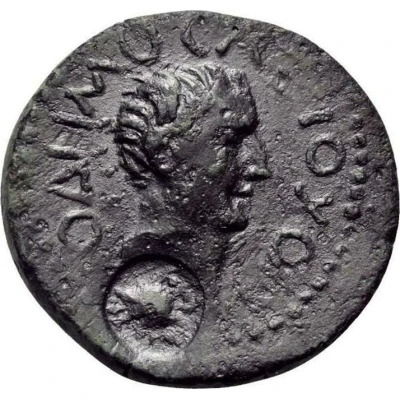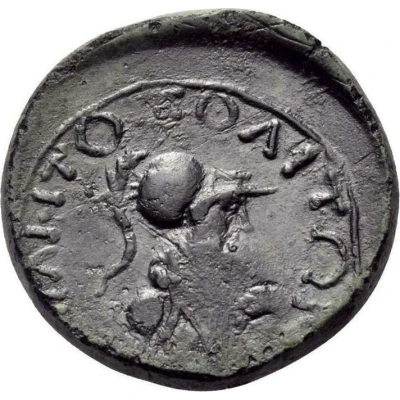


Æ28 - Demos ΜΙΛΗΤΟΠΟΛΙΤΩΝ 100 BC - 100 AD
| Bronze | 5.95 g | 21.5 mm |
| Issuer | Miletopolis (Conventus of Cyzicus) |
|---|---|
| Type | Standard circulation coin |
| Years | 100 BC - 100 AD |
| Composition | Bronze |
| Weight | 5.95 g |
| Diameter | 21.5 mm |
| Shape | Round (irregular) |
| Technique | Hammered |
| Orientation | Medal alignment ↑↑ |
| Demonetized | Yes |
| Updated | 2024-10-10 |
| Numista | N#410067 |
|---|---|
| Rarity index | 100% |
Reverse
Helmeted bust of Athena, wearing aegis, right.
Script: Greek
Lettering: ΜΙΛΗΤΟΠΟΛΙΤΩΝ
Comment
Magistrate of Axiochos.
While the portrayal on the obverse of this coin may be either the individual Axiochus or the Demos of Miletopolis, the obverse inscription makes it clear that this coin was struck to honor one of that city’s benefactors. By following Greek epigraphic convention, the name of the dedicatee (AXIOCON) is placed in the accusative case, while the verb of dedication is not indicated, but implied: “The Demos honors Axiochus.”
Just who this Axiochus was remains a mystery. The name is not unknown in the Greek world (a dialogue of the same name ascribed to Plato is known), and several Romanized Axiochi are attested in inscriptions and graffiti (cf. CIL VI.13.19 - Sex. Pompeius Axiochus). What is clear is that Axiochus was one of the numerous euergetai, or benefactors of the Roman Empire: wealthy individuals who supported public projects, or liturgies, in their hometowns. By doing so, they alleviated the burden of the imperial treasury, while at the same time, improving their own standing in the community.
Interesting fact
The Demos (ΜΙΛΗΤΟΠΟΛΙΤΩΝ) coin from Miletopolis (Conventus of Cyzicus) features a unique design on its reverse side. It depicts a stylized representation of the city's iconic landmark, the Cyzicus Monument, which was a grand tomb built for a Persian satrap named Mausolus in the 4th century BC. The monument was famous for its impressive size and ornate decorations, and it became a symbol of the city's wealth and power. By featuring this image on the coin, the mint authorities of Miletopolis were able to showcase their city's rich history and cultural heritage.